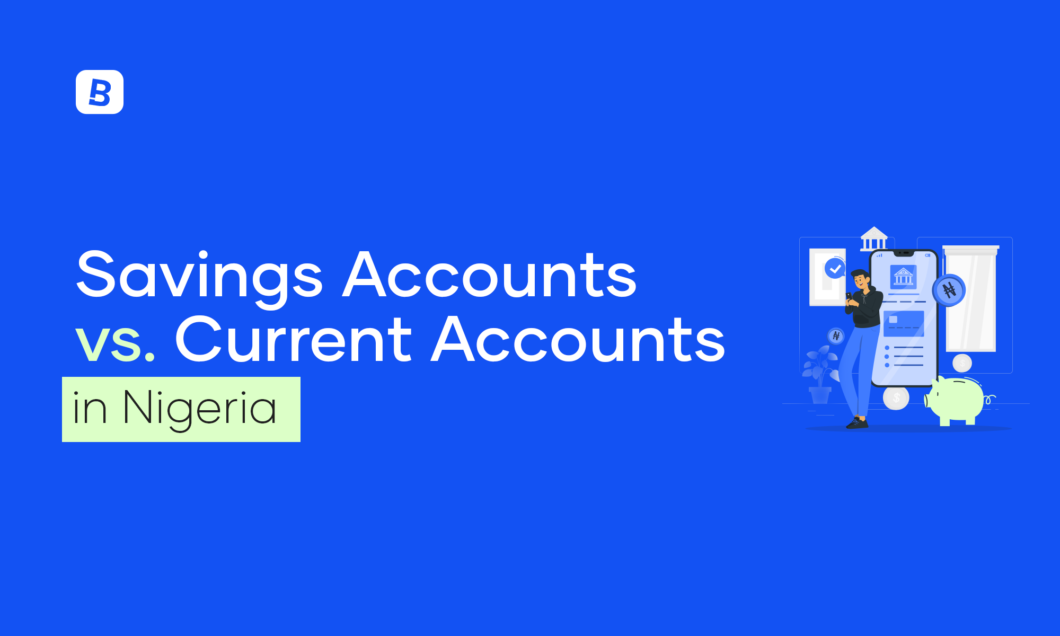Are you a beginner to banking and wondering what the different types of accounts are? This is a complete guide to the two most basic types of bank accounts that you can have in Nigeria. These are savings and current accounts.
To understand which is best for you, you need to first understand each type of account and how it works. Ready? Let’s get started!
What is a Savings Account?
A savings account in Nigeria, just like in other places around the world, is a type of account that allows you to deposit your money and earn interest over time.
A savings account is usually a good place to keep money that you don’t have any short-term plans for but might want to use for emergencies. You can also use a savings account to build up your finances towards some goal or the other.
For instance, if you’d like to take a vacation or start a small business, putting some money away in a savings account would be smart. For more information on savings accounts, here is our complete guide to savings accounts.
What is a Current Account?
A current account is a type of account also offered by regular banks but with significant differences from savings accounts. Primarily, when you open a current account, you will be given a chequebook–which explains why current accounts are also called checking accounts.
Additionally, most banks will charge you each time you make a transaction using a current account, making them more expensive to maintain than savings accounts. Current accounts are ideal for businesses or individuals who undertake frequent financial transactions.
Differences Between a Savings Account and Current Accounts
Now that you know what savings and current accounts are, let’s look at some of their key differences.
1. Interest Payments
Savings accounts offer some interest on your savings. Current accounts, on the other hand, do not pay any interest, and you will, instead, be charged for each transaction you make.
2. Fees
Just as we’ve noted above, you can expect to be charged for transactions you make while using a current account. With most banks, however, transactions made on a savings account are meant to be charge-free.
Some Nigerian banks, however, allow users to make frequent transactions on their savings accounts, and therefore charge some fees. This means that in Nigeria, savings accounts sometimes work quite similarly to current accounts.
3. Accessibility
Ideally, you shouldn’t be able to make frequent withdrawals from a savings account, and most banks will impose withdrawal limits on your savings account. With current accounts on the other hand, you can usually make an unlimited number of transactions, but bear in mind that you’ll typically get charged for each one.
That said, most Nigerian banks operate a flexible policy when it comes to savings accounts, and may allow frequent withdrawals.
Now that you know the differences between savings and current accounts, let’s discuss the best savings options in Nigeria.
Which Type of Financial Institution Should You Save With?
When it comes to saving in Nigeria, you’ll have quite a few different options.
1. Conventional Banks
You can save safely and conveniently with conventional banks but typically they offer lower interest rates than other financial institutions. In general, interest rates from conventional banks range from 1% – 5% annually.
2. Microfinance Banks
Another option to consider is microfinance banks. These are financial institutions that are similar to regulate banks in many ways except that their services are generally tailored towards lower income earners.
With microfinance banks, you can expect higher interest rates and easier access to things like loans. Generally, interest rates from microfinance banks will be above 5% annually.
3. Fintech Apps
The third savings option you’ll have in Nigeria are fintech apps. These companies offer many of the same services as regular banks and microfinance institutions, however, they tend to offer the best interest rates and savings and investment options, with interest rates generally above 10% annually.
Which Bank or Financial Institution is the Best for Saving in Nigeria?
While we’d strongly recommend saving with a digital payment app, there are dozens of apps that fit this description. If you’re looking for reasonable interest earnings, however, along with a safe and reliable platform, and a bunch of useful addon features, we’d absolutely recommend using Bold.
Bold is Nigeria’s leading digital savings and payment app, with a suite of services that includes not only digital payments, but other essential financial services like high-interest savings accounts, affordable loans, virtual cards, and so much more. If you’d like to review more apps before you choose, here’s our guide to the top fintech apps in Nigeria.
To learn more about Bold, read our full Bold review here.
Ready to Get Started?
When choosing the best way to save in Nigeria, you’ll have quite a few different options. These include regular banks, microfinance banks, and digital banking apps.
We’d strongly recommend that you get started with Bold, Nigeria’s best payments and savings platform, where you can earn as much as 15% interest on your deposits.
It’s super easy to get started with Bold. All you have to do is visit the Google Play Store or IOS store to download the app. Once downloaded, simply create an account and get verified. With these two important steps out of the way, you can get on with using Bold to save at the best interest rates.
Go ahead and download the app right away. We can’t wait to meet you!




